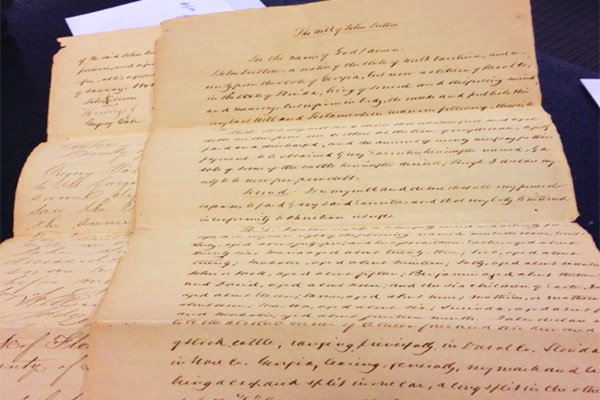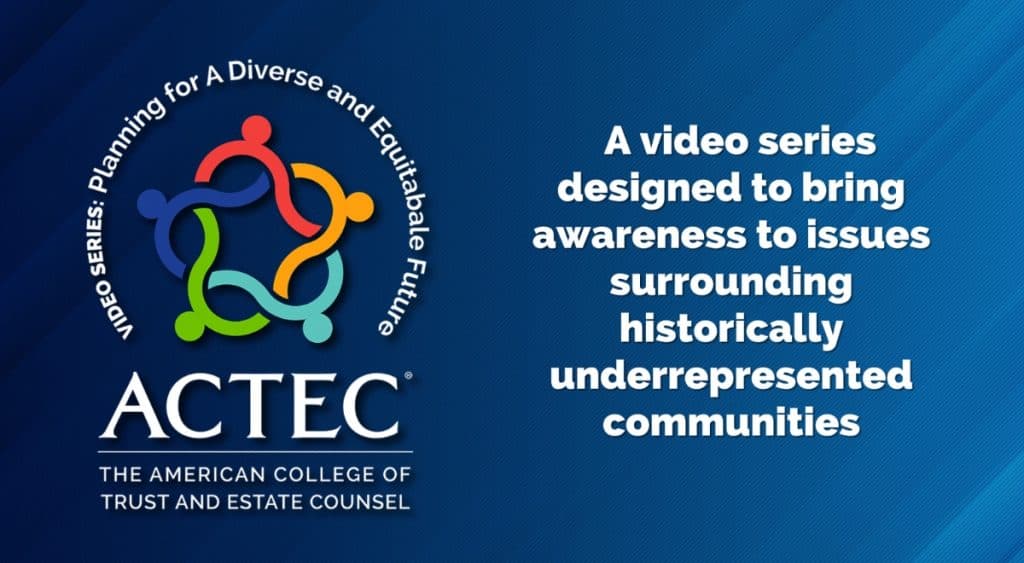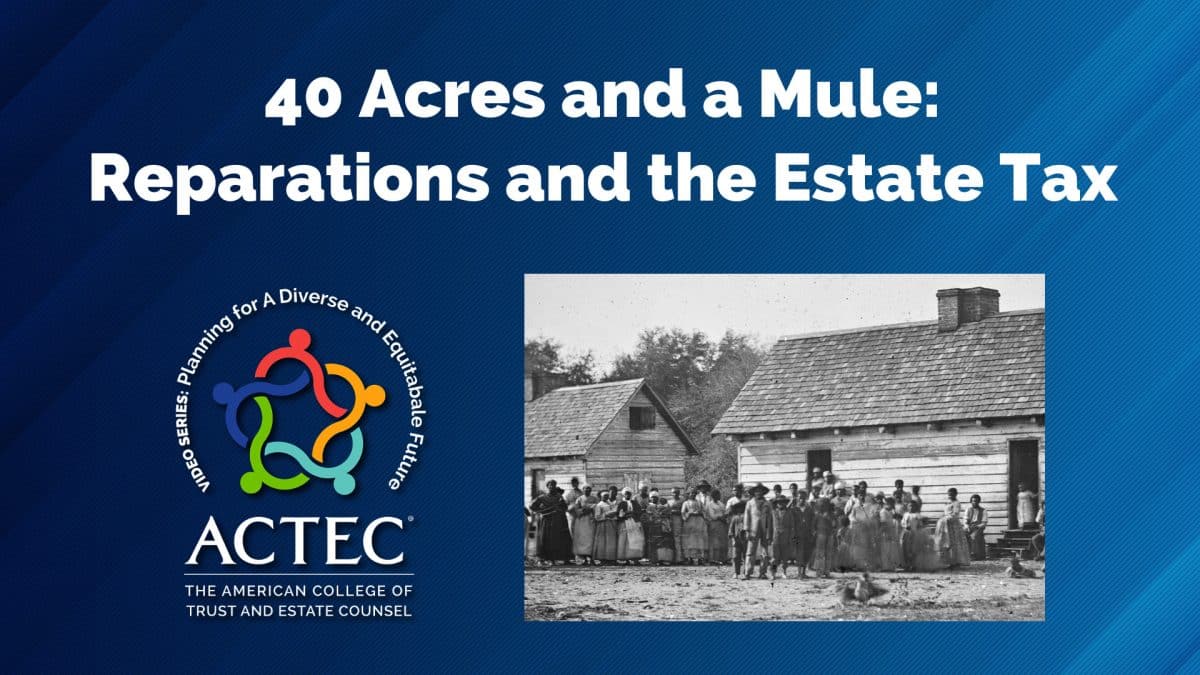Estate planning can significantly impact future generations. In honor of Black History Month ACTEC Fellow Terrence M. Franklin shares his journey of discovery: how his fourth great-grandmother Lucy Sutton and her eight children and six grandchildren were freed from slavery through a last will and testament.
There is no greater time than now to effectively communicate your intentions and protect your legacy through a will and estate planning documents. Visit ACTEC Estate Planning Essentials to learn more about estate planning topics.

Resources
ACTEC Family Estate Planning Guide — This video library offers individuals and families insight into the fundamentals of wills and trusts to encourage planning.
- The Last Will of Lucy Sutton – Terrence Franklin’s 2020 presentation for Black History Month to the Harvard Club of Southern California and the Harvard Black Alumni Society of Southern California
- Association for the Study of African American Life and History – The mission of the ASALH® is to promote, research, preserve, interpret and disseminate information about Black life, history and culture to the global community.
- African American Probate Records
- Finding a Name: Why Probate Records Are a Gold Mine for African Americans – Blog from Ancestry.com
- Library of Congress – extensive library for researching African American History
- African American Genealogy– Tips for do-it-yourself research
- United States, Slave Transactions (National Institute)
- BlackPast – a reference center dedicated to providing information to the general public on African American history
- Smithsonian Magazine – A Massive New Database Will Connect Billions of Historic Records to Tell the Full Story of American Slavery
- Freedom Narratives – This digital repository of autobiographical testimonies and biographical data establishes where people came from, why they were enslaved, whether or not they freed themselves, and what happened to them
- Equal Justice Initiative – EJI works to end mass incarceration, excessive punishment, and racial inequality.
Prequel Statement
Terrence M. Franklin — February 2021
The cruel institution of American slavery rested on the idea that not all people are human beings – that Black people are not the same kind of being as white people. That idea was woven into American institutions and policies, and written into laws presuming Black people to be enslaved, and defining all enslaved people as property from birth – a status inherited from generation to generation. It should feel uncomfortable, upsetting, and perhaps make us angry, to imagine with “20/20” hindsight the life of an enslaved person, with no say over where you went, what you did…who had sex with you. But it should also upset us to consider the dehumanization of people who were not enslaved, who thrived and benefited from slavery, accepting such inhumanity without resistance. The way to redeem that humanity is to push back against dehumanization and oppression. My goal in sharing stories like that of my ancestors, which may seem to have a satisfying or even happy ending, is to encourage people today to first see the sheer inhumanity of slavery – the deprivation of control over one’s life circumstances — to then appreciate slavery’s ongoing impacts in our society, and finally be compelled to take action to resist inhumanity and oppression today.
Transcript
ACTEC Fellow Cynthia G. Lamar-Hart: In honor of Black History Month, The American College of Trust and Estate Counsel, ACTEC, presents a mini-documentary that offers searing insight into the enduring legacy of slavery in the personal histories of many African American families in this country. We invite you to join us in hearing from ACTEC Fellow Terry Franklin, as he shares the powerful story of how a Last Will and Testament from 1846 played a critical role in freeing his fourth great-grandmother, Lucy Sutton, and her family from slavery.
Terrence M. Franklin: Hi. I’m Terrence Franklin. I’m a Fellow in the American College of Trust and Estate Counsel. And I wanted to talk to you, a little bit, about why it is important for everyone to have estate planning and particularly why it might be important for people of color, and especially African Americans.
I bring a particularly unique experience to this. I’ve been a trust and estates litigator for nearly 30 years, which means I do will contests, family disputes, and so forth. But I’d been doing it for about a quarter of a century when I discovered in my own family a quite interesting will contest that I did not know was part of my own family’s history. I was trying to do something to celebrate my great aunt’s hundredth birthday and thinking about how I could possibly celebrate her life because she’s been so significant to our family members as a matriarch. I went looking for a piece of information that I had seen at a family reunion, some almost 20 years before; and what I’d seen in that set of reunion materials was a typed-up portion of a will that indicated that a man named John Sutton, who was of sound mind, but infirm in body, was setting about to create his own new will. And he indicated that he had owned the following property, to wit, a “mulatto slave Lucy,” aged about 45, her daughter Easter, aged about 26 and so forth and so on, listing all eight of Lucy’s children as well as six children of Easter — all of whom John owned. All of whom he was identifying in his will and all of whom he was setting free by the will.
Now, this was typed up in a little bit of family reunion materials back in 2001. And in honor of my great aunt’s birthday, I set about trying to see if I could track down the original copy of the will. Being a Fellow at ACTEC, I was able to access resources, including the names of people who were in Duval County Florida, which is where the will was recorded. And I called a couple of lawyers there to see if, possibly, they might be able to help me track it down. The first lawyer that came back to me told me that there was a fire in 1901 that destroyed all the records in Jacksonville and that I was probably not going to find anything. But the second person that called me was a paralegal and I explained to her that I was trying to do this for my great aunt’s hundredth birthday; and that she’d been the person who had walked four miles each way to get her degree from Southern Illinois University. And she was a really special person in our family. And I told her that I knew that there had been the fire in 1901, so it was unlikely that I was going to be able to find the original will, but the paralegal said, “There was the fire but let me see what I can do.” Well, by the end of that day I had an email back from her that indicated that she had found a John Sutton file and she wasn’t sure if it was the right one but she would have it by Friday of that week; and this was the week I was going to be flying back to the Midwest for my great aunt’s birthday. That morning, when I got up and went to the office, I had an email from the paralegal and she said, “we found it; we found the right will!” And she asked me what I wanted to do. And I had her take photos. And she sent me, across time, a hundred and seventy years, across the ages and across the Internet, I got this image of this document; and it was red wax sealed before the days of lick’em stick’em envelopes. And it was in handwritten fine script by an attorney named Gregory Yale, who drafted the document. I suddenly had this image that was in my hands, that I could see and visualize and imagine this story about this white man named John who owned this mulatto slave Lucy and her eight children and her six grandchildren. And to me, it had suggested that perhaps this was a family.
As I did research over the next few months and tried to understand what the meaning was with his relationship and wrote an article and got some inspiration from other people, I came to understand that, in fact, John and Lucy probably did have a family.
And as I began to outline the ideas for a novel that I wanted to write, I decided to write in a will contest, because that’s what I do for a living. And they always say, if you’re going to write something, you should write about what you know. And I invented a character named Eustace, cause it seemed like a good old-timey name, who is John’s brother who challenged the will and tried to keep the family in slavery. And I began taking notes and outlining this whole concept.
About six months later, I was at a conference for ACTEC in southern Florida and I suggested to my partner, then, and now my husband, Jeffrey that we should drive and see the will itself. So Jeffrey and I decided to make the drive from Marco Island, which is in the south part of Florida, all the way up to Duval County where Jacksonville is, which is where the will was recorded. And we decided to make the drive as meaningful as possible. We had done some research and found out that the Equal Justice Initiative, headed by Bryan Stevenson, a social justice activist and lawyer, had documented some 4,000 lynchings that had taken place in the South between the end of the Civil War and the civil rights era. And we decided that if we used our Internet, we could follow each one of those lynchings and understand the stories of those families that had been affected — those individuals who had died in the families that had been destroyed and whole communities that had been shattered by these acts of terrorism. And at the end of our drive, a hundred and twenty-five lynchings later, we made a donation to the Equal Justice Initiative as a way of pushing back against the racism that is such a part of so much of American law.
In the end, Jeffrey and I arrived at the courthouse and made our way into the courthouse and made our way down to the bowels of the probate department. And once we were there, we scrambled with the clerks who couldn’t find the will at first, even though we called ahead for it; and eventually found it sitting on a supervisor’s desk. And they handed me a little red will envelope, probably about the size of a lady’s clutch purse, and as I undid the band on it, I wondered what would happen. Would I be emotional? When I undid the band and opened up the envelope, it was almost like there was a sense of the smoke and ash from 170 years before – from the original time that the document was created that had survived the Great Fire of Jacksonville to find its way into my hands. And it was almost like the documents in there were glowing with the emotion of the people who had written these pages that ended up setting my family free. It was almost as if, somehow, these great expectations for this great, great, great, great grandson or somebody might find this file and somehow be able to unlock its mystery.
I realize that it wasn’t just the will that my great, great, great, great grandfather had made and made his mark on. There was a whole will contest file. And so, the will contest that I had imagined had happened, really had happened; and that the uncle that I called Eustace, as a good old-timey name, was really named Shadrack. Shadrack Sutton had fought to keep my family enslaved. As it turns out, there was also the transcript from the trial, which included the judge’s handwritten notes. And so, Judge Crabtree, William F. Crabtree, who was the judge, indicated in his notes that Gregory Yale had gone out to the house – he’d been summoned by the family. He referred to them as the family, not as his slaves. And that he’d spent time talking to John and to his sons and daughters and that they explained to him that the reason why they had moved to Florida was because they had left Georgia believing that they could be emancipated in the state of Florida. But it wasn’t until they got to Florida that they found out otherwise. That’s why they had to do the will.
It also turns out that at one point, Lucy came into the room; and Lucy said she would have been just as happy to stay with Shadrack or move away, except Shadrack had always threatened that he would beat them if he ever came to own them. So, this underscored the urgency for the need for the family to be free.
As it turns out, on March 10th, 1847 Judge Crabtree banged his gavel and ruled that the will contest was invalid. That the will itself was valid and was upheld, and he ordered Shadrack to pay $28.08 in court costs.
So this story of my ancestors who did something — who pushed in a way to try to counteract racist policies that prohibited the emancipation of slaves in the state of Georgia and in the state of Florida — they found a way to push back against that by taking on an anti-racist act. By creating these documents. And I happen to believe that my great, great, great, great grandmother Lucy had some influence on it too. Maybe not under undue influence, but she made sure that John saw to it that their family was going to be set free. And they were able to make their way to Illinois, Polk County, where they claimed their freedom in December of 1846.
Thinking about and taking action to do estate planning as a way to be anti-racist, to not let a network of policies of property ownership and transfer that have negative impacts on Black people control how we live our lives. Just as my ancestors used a will — an estate planning tool — to take the anti-racist and anti-slavery step of setting Lucy free, as well as her eight children and her six grandchildren, we can be anti-racist by taking care of our business and making sure that we are making the choices instead of leaving them up to someone else.
And I promise, this week, I’m going to update my own estate plan.
ACTEC Fellow Cynthia G. Lamar-Hart: Every day in this country, people of all ages, races and socio-economic backgrounds die without an estate plan in place, leaving their loved ones without any formal instructions as to their wishes. Rather than leaving a plan that has been thoughtfully designed with their beneficiaries’ particular needs in mind, these decedents have entrusted their estate plans to the default provisions provided by state law. Please consider making it a priority this month to give your intended beneficiaries the gift of clarity by documenting your intentions through a formal estate plan.
This video is an episode of the “Planning for a Diverse and Equitable Future” video series. Resources for this video, such as free information regarding wills and estate planning documents, may be found at ACTEC, actec.org/diversity. Also, please subscribe to ACTEC’s YouTube Channel to be informed of new videos as they become available.
Featured Video
40 Acres and a Mule: Reparations and the Estate Tax
An introduction to wealth disparity due to slavery and enacted under Jim Crow, the history of reparations and a possible solution to the wealth gap.
Planning for a Diverse and Equitable Future

ACTEC’s diversity, equity, and inclusivity video series analyzes issues surrounding racism, sexism, and discrimination in all its forms to combat inequality.

